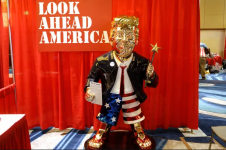I’m not saying anything I haven’t said before, but the grand experiment that was the Republic of the United States of America is already dead. It just hasn’t quite stopped moving yet.
Yep, also RIP the middle class, because that's gone too.
Gonna take a stab at this. If you’re rich you a) likely don’t need public transportation and you likely don’t won’t poor people around you, especially your neighborhood. If you’re poor and public transportation moves in it brings more non poor traffic to the area which drives businesses to increase presence which drives interest to middle class as they want convenience and can afford housing the poor cannot. The great scourge of the middle class is the suburban commute.

And since the middle class is dead, we have a bunch of rich people opposing public transportation because it might bring the unwashed masses to their doors. People are commuting into cities to work menial jobs. I know people who commute from the "poor side" of the suburbs to the "rich side" of the suburbs because grocery store cashiers don't make enough money to live in the suburb (not the city, but the suburb of the city) where they work. The argument against public transport is a weak one, but the people making the decisions to allocate resources are all the rich people who don't want public transportation.
When it comes to gentrification I don't even think of the middle class when it comes to Boston. I think of the upper middle class and the wealthy moving into neighborhoods.
Assembly square for example, they turned an old train yard into high end retail, office space and apartments with it's very own orange line station. A brand new station stop for this development.
Rent in these apartments starts at no less than 4k a month. There really are no more true minority communities in Boston or right out side. They have all been priced out with high rent and property taxes.
I don't think of public transportation as being for the poor. That's a bad stigma it still carries though, only the poor and minorities use it as well as college students. But it really has turned into commuter services for the working middle class and is really the only method of transportation I can afford into Boston to work each day. I certainly can't afford $1200 a month reserved spaces in garages or $50 a day parking. And if you park on the street with metered parking, besides good luck finding a spot, you have to move your car every 4 hours to avoid a ticket.
Meanwhile I see people driving into work in the Jaguars, corvettes and what not each day who have private reserved parking spots in the building they work at paid for by work.
The affluent areas keep blocking the expansion of public transportation and oppose it. Especially to the north side of the city as there are a lot of affluent neighborhoods there. And them blocking the public transportation only hurts people like me who live way outside of Boston on the north side looking to commute in to work.
I wonder if it's still very much racist in nature. Lexington and Concord block the Red Line expansion into their communities in the early 80's in favor of a bike path. The Red Line coming to those communities was a popular proposal until someone looked at a map and saw the other end of the Red Line connected to communities filled with "undesirables". Then those communities took a 180 very fast and it was "not in our community".
Yeah, the people in Boston that can afford all this aren't middle class. They would like to believe they are, but they are in the top 10%.
This got me thinking. What did America get right and what did we get wrong? Where were turning points? Is all this inevitable? Is it particular to America or just part of how humanity works?
ooooooooooooooooo
this is too much to unpack. I think one of our big mistakes was when we decided not to nationalize healthcare. But as far as when things really started to go wrong, probably around the 1970's when people were clamoring for privatization of government functions. Couple that with lax regulators that decided to look the other way instead of imposing the anti-trust laws that are already on the books, and you got a playground for monopolies. Competition decreased during this time as did American innovation. Worker protections slowly died along with most of our unions, and jobs were shipped overseas.
I think part of where we messed up was during this time when we decided that we were okay with products made a world away by people who were not being properly compensated for their time because it was cheaper. I think that's when we lost our soul. We, as Americans, touted our can do spirit and ingenuity. We showed the rest of the world that it didn't matter who you were, just how hard you worked. This was novel because at the time, the only way people got ahead was to be born into it (for the most part). For the first time, everyone was on equal-ish footing (we won't touch on race here but yes, that did and still does play a big part). Then we, as a society, decided that it was okay to ship some factories over seas, but we retained our ideas and ideals that workers should be compensated fairly and treated with respect. We started getting cheap goods, but we also started realizing that workers weren't exactly being compensated or treated the way we compensate/treat our workers, and instead of reversing course or insisting on better conditions, we looked the other way. It was cheaper, easier and more convenient for us, and I really think that was the beginning of the end.
This opened the door for all sorts of financier based capitalism, and eventually, it became (and is now) easier to make money on interest, loans, or rent than it is to make money making things. So people stopped pouring time into product innovation and started looking at how to make money using predatory financial products. Capital investments are not being used to open factories; but instead to buy cryptocurrencies or stock options. We are in a system where financial voodoo is currency instead of actual production. This is largely due to wages being stagnant and decoupled from the economy (and wages could become stagnant and decoupled thanks to monopolies). It's no longer worth people's time to work low wage jobs because these wages could get in the way of government entitlements.
Please realize that this is all based on me reading a bunch of things and thinking about them, so none of this is verified in any way, but if you want to know where I think it was, it was when we decided that it would be a good move economically to be okay with sweat shops--and then later think we could compete on price with sweat shops.



